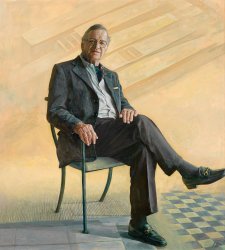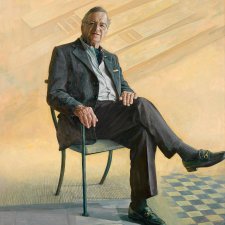Koiki (Eddie) Mabo (1936–1992) initiated a legal case in 1982 which ultimately led to the establishment of the principle of native title within Australian law. Born on Mer (Murray Island) in the Torres Strait, Mabo grew up immersed in Meriam culture and became active in political causes after moving to the mainland in 1959. His address to a land rights conference in Townsville in 1981 prompted a group of Meriam to lodge a case with the High Court for legal ownership of Mer. In the 1988 case known as Mabo No. 1, the High Court found that Queensland legislation seeking to extinguish Torres Strait Islander land claims was in contravention of the Racial Discrimination Act. In the case known as Mabo No. 2, the seven Justices of the High Court found 6-1 in favour of Mabo and his co-plaintiffs, overturning the view that Australia had been terra nullius (nobody’s land) before colonisation.
John Citizen is the artistic alter ego of Gordon Bennett, whose work examines ideas of cultural and personal identity and colonialism. Bennett said that initially he 'could not think of [Koiki] as a real person … I only [knew] the Eddie Mabo of the "mainstream" news media, a very two-dimensional "copy" of the man himself.' To create this portrait, he used a newspaper image and headlines combined with an image by the American artist Mike Kelley. 'To me the image of Eddie Mabo stood like the eye of a storm, calmly asserting his rights while all around him the storm, a war of words and rhetoric, raged.'
Purchased with funds provided by L Gordon Darling AC CMG 1999
© Gordon Bennett Estate
This is a portrait of Eddie Mabo, an activist from the Torres Strait Islands by Gordon Bennett. Its full title is “Eddie Mabo (after Mike Kelley's 'Booth's Puddle' 1985, from Plato's Cave, Rothko's Chapel, Lincoln's profile) No.3”.
It is a large and extremely complex painting on unframed, stretched canvas. Painted with acrylic paint, it is 168.0 cm high x 152.5 cm wide. The upper part of the painting has a background covered by words and phrases and the oversize smiling face of Eddie is centrally placed and dominates the image. The bottom third of the painting breaks out into a series of different styles.
The background of the upper larger section of the portrait has words and phrases in white, yellow ochre and red ochre, varying sizes and fonts layered over each other and crowded within the frame. A visual cacophony. The phrases include: people dispossessed, hurt lingers, white myths damage our souls, rednecks rule, abo threat, opinion analysis, underbelly of racism.
The oversized face of Eddie Mabo is centrally placed overlaying the mass of text. He is recognisable yet not painted realistically. He has dark, tightly curled hair brushed back off his high forehead. His face is an unusual combination of black, tan, white and green, the white indicating light and the green showing shadow. There is pixilation across his forehead, his broad nose and his left cheek.
His wide set, semi-circle eyes gaze to his right as if amused at something just out of view. His lopsided broad and beaming smile rounds and lifts his cheeks, and his generous mouth is open, revealing large, white teeth. He has a thick bottom lip.
His ample moustache extends into his beard which covers the lower part of his face and chin. At his neck his beard merges into the ochre background. Three fine lines, cobalt blue, mid-green, and black outline Mabo’s head and beard. Scribbly black lines of varying thickness that look like the outline of hills are where his left shoulder would be. Underneath these lines is the statement ‘Make no right turns’.
Below this an expanse of vibrant, mottled yellow contains simple white outlines of leaves, animals, hand prints and concentric circles forming a distinct yet irregular pattern.
The bottom of the painting is a modern cityscape, a picture within a picture. Skyscrapers of varying heights extend from the left edge of the painting to just past the centre where the built environment collapses into a mess of black angular and curving lines.
A strip of red paint extends cross the bottom printed with the statement ‘That fork in the road leads only to despair – madness’. In the far-right corner is the signature J Citizen ’96
Audio description written by Krysia Kitch and voiced by Rory Walker
The Gordon Darling Foundation (36 portraits supported)



On one level The Companion talks about the most famous and frontline Australians, but on another it tells us about ourselves.



A new painting by Jiawei Shen captures the vision and resolve of the Gallery's founder, L. Gordon Darling AC CMG.



This exhibition showcases portraits acquired through the generosity of the National Portrait Gallery’s Founding Patrons, L Gordon Darling AC CMG and Marilyn Darling AC.